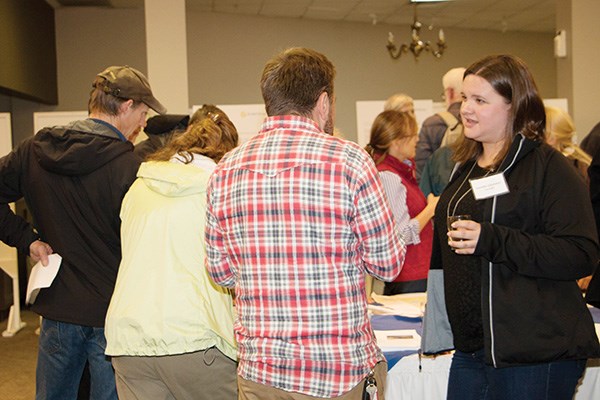It might be hard to believe there is still a conversation to be had about women in non-traditional careers in 2016.
But Danielle Gillanders, 27, a chemical engineer who works in Â鶹Éçąú˛úon plans for FortisBC’s proposed Eagle Mountain to Woodfibre LNG pipeline, is still in a minority at work.
She said at the University of Waterloo in Ontario, almost half of her class was female, but at work, women are still a rarity.Â
“There’s just not that many more experienced women, there is not that many young women. I go into rooms all the time where there are 25 people for a technical meeting and I am the only one,” she said.Â
Currently about 12 per cent of professional engineers in Canada are women, according to Elizabeth Croft, UBC engineering professor and associate dean in education and professional development.Â
Gillanders stressed that as a company, FortisBC seems to be deliberately working toward a diverse workforce. But when working with contractors and people out in the field, it is different, she said.Â
She recalled an incident when she worked on a project with four older operations workers, who sometimes called her “sweetie” and clearly weren’t used to a woman’s presence on a job site.
“It was one of the first projects I had worked on out of university and with all these guys who really knew what they were doing, and my direction from management was to try and change something they were doing,” she said. “That was difficult.”Â
Thinking of the men as just people who were relating to her the only way they knew how helped her feel more comfortable. Humour helped too, as did being clear that her only goal was to help make things better, she said.
She said with the new technological skills she learned in school, she was able to find work as an engineer in the pipeline industry. She’s part of a team planning the proposed Â鶹Éçąú˛úpipeline route underneath the Â鶹Éçąú˛úEstuary.Â
“That is a really challenging area. There’s a lot going on there,” she said.Â
She explained that the technology for installing pipeline using a trenchless method that would eliminate surface disturbances in the Â鶹Éçąú˛úEstuary is new, and she brings new technical knowledge to the table.Â
“Having experience of digging a hole and putting a pipe in it doesn’t really help you in this particular realm. It is a newer industry so it is more accessible to me,” she said.
Tamara Pongracz, chief instructor of trades access at the British Columbia Institute of Technology, said things are changing in the trades, but slowly.Â
“It’s kind of been an evolution, as opposed to a revolution,” she said.
 “We have been telling little girls for generations that they can be anything they want to be, and yet it hasn’t come to fruition in engineering, science and trades – but we’re getting there.”Â
Pongracz, whose trade is plumbing, said she no longer hears stories of direct sexism, as there used to be on job sites, but said there is still subtle discrimination, which can manifest in people hiring or promoting others who are like themselves, thus leading to men hiring men, for example.Â
She said as more women are getting into trades and other male-dominated professions, “dinosaurs are becoming extinct.”
As of March 2015, there were approximately 4,200 registered women apprentices in B.C. representing 10.8 per cent of all registered apprentices, according to the Industry Training Authority (ITA). In 2009, eight per cent of all apprentices were women.
Croft agrees change is happening, adding that while currently 12 per cent of engineers are women, 20 years ago that figure was just four per cent. Croft said UBC has outreach programs to girls of all ages, including summer engineering camps just for girls.
“You know if you have a party and you don’t invite people, no surprise, they don’t show up. So we have really looked at how we are messaging to students, starting as early as Grade 6 because that is where kids start to make decisions about what they want to be when they grow up,” she said.
As for Gillanders, she said what she loves about her job is how much variety there is. She can be out in the field in a trench or in a boardroom all in one day.Â
“I can’t think of another job I would rather be doing,” she said.Â




